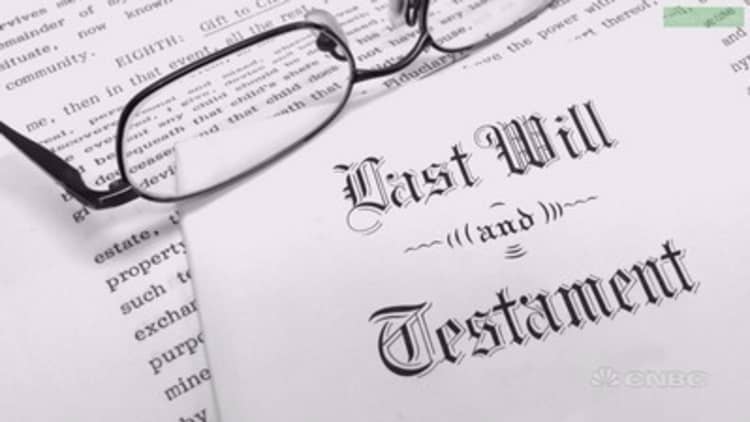A devastating medical diagnosis can leave you shocked and terrified, not to mention caught short with your financial plans.
Instead of giving into blind panic, here’s how to start charting your finances.
When faced with chronic disease or disability, noted psychiatrist and author Elisabeth Kubler-Ross’ five stages of grief can be helpful, said Marty Shenkman, an estate-planning attorney in Fort Lee, New Jersey, “even if they don’t happen in that exact order.”
“It may seem awkward or uncomfortable, but there’s no reason not to reach out to a mental health professional or social worker for guidance,” said Shenkman, whose wife was diagnosed with multiple sclerosis in 2006.
Your family may also be struggling, and it’s a good time to seek help. “Another great person to talk to is your care manager, who can be a social worker or RN with expertise in this area,” he said. “They can bridge some of the different issues.”
“Frequently in estate planning when there is an emotionally charged event, all sorts of things that have been kept under the surface boil over,” said Shenkman. “Yet you need to do planning.”
Financial info in one place
“First, set up a ringed-binder notebook so you can easily add information,” said Ken Hoyt, a certified financial planner at Perennial Advisors Group in Westford, Massachusetts.
If you have a beneficiary on every single asset and all your belongings are given away, you don’t need a will.Ken HoytCFP, Perennial Advisors Group
“The important thing is having all info in one place, so relatives aren’t struggling to find stuff,” Hoyt said. “You can get things tied up quickly.”
Start with a will. If you don’t have one, make a list of your assets: financial accounts, real estate and retirement accounts.
“The will is the catchall for anything without a beneficiary,” Hoyt said. “If you have a beneficiary on every single asset and all your belongings are given away, you don’t need a will.”
Wills are helpful to avoid legal wrangling. “Property is best spelled out in a will,” Hoyt said.
Choose beneficiaries
Among these first tasks, Hoyt says, should be designating beneficiaries on your financial accounts. “It’s very basic, but it’s more powerful than a will,” he said. "That way, assets don’t have to go through probate.”
Another thing people may not know is that most brokerages let you attach transfer-on-death instructions to your non-retirement account.
In fact, transfer-on-death deeds can also be used in real estate in 27 states, including Arizona, Illinois, Indiana, Ohio, Texas and Washington, D.C. Exceptions include Connecticut, Florida, New Jersey, Pennsylvania and New York.
Next, detail your liabilities — mortgage, loans, credit card debt — and insurance policies for health, home and any vehicles.
You’ll want to have a contact list of people your family can reach out to for help. Include your lawyer, accountant, insurance agent and financial advisor. Write down everyone who needs to be in the loop.
Even if you already have an estate plan, it can be a good idea to consult with an attorney experienced in estate planning.

Laws may have changed since you signed existing documents, and your plan may no longer work the way you intended it to.
Lighten the tax burden
One tax-advantaged way to leave money to heirs is through a Roth individual retirement account. Another is a brokerage account, because any capital gains tax will be wiped out due to the step-up in basis on the original price paid.
Here’s how it works. The original owner buys stock at $20 a share. Over the years, the price rises to $40. If the owner sells the stock, he’d have to pay capital gains based on that higher price.
But if the owner dies and leaves the stock to an heir, the new owner receives the stock at a new basis price: $40. Any gains in price after that — and not the original $20 price — will be used to calculate the tax owed.
If some asset has dipped significantly in value, though, you might consider selling the stock, mutual fund or ETF. As the original owner, you can deduct the losses by selling and deducting the loss. But your heirs would not be able to take this step-down, since they’d inherit the stock at a new, lower basis.
If you are older than 70½, take any required minimum distribution from your retirement accounts. Heirs may not know to do this, and there is a significant penalty for not taking it.

Another way to minimize taxes for your inheritors is through charitable donations. While your heirs would have to pay tax on the money in a retirement account, a charity would not.
Paying off a mortgage
Many people consider paying off a home mortgage, but since individual circumstances vary greatly, this may not always be the best course.
To start with, consider the amount of funds available, the current tax bracket and the size of the mortgage balance. It might be wise to have a financial planner run several scenarios to see how you can minimize the tax hit from withdrawing a large sum from a traditional IRA or 401(k) plan – or if you should leave it as a loan to be transferred to your heirs.
Make passwords available
Consider writing down all passwords in the binder. “It’s fine to have that, knowing that only one or two people will see it,” Hoyt said.
Keep track of your pension and Social Security benefits, since there could be survivor benefits that flow from those.
Your binder should include a copy of the previous year’s tax return.
When a final tax return is prepared, there might be some carryover items, such as long-term alternative minimum tax or long-term gains buildup. “If you have long-term losses, they can be carried over into that final year,” Hoyt said.
Other areas to consider in your binder: arrangements for your pets and talking to the financial aid office, if you have a child in college. You’ll want to inform them of your change in financial status.
List all service agreements, such as landscaping, utilities, cleaning and insurance, and auto payments. Arrange for their continuation or cancellation.
“Make a list of personal belongings and who you’d like to have them,” Hoyt said. “Often that is not spelled out in a will.”
More in Personal Finance:
Make sure you are paying the lowest possible cost for your prescription
Take some time to do this simple thing. It might just get you that job
Americans are more willing to move to these cities for a new job

